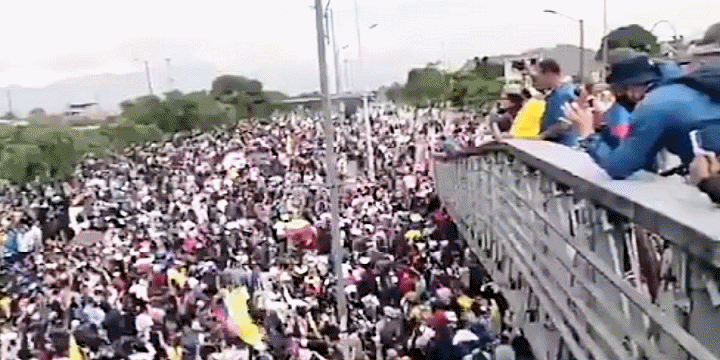COLOMBIAN PRESIDENT IVAN DUQUE USES ARMY IN STREETS OF CALI |
|
Epicenter of the demonstrations which left three more dead in the same day! "From this night begins the maximum deployment of military assistance to the national police in the city of Cali", announced the president in this city of 2.2 million inhabitants, the third in the country, where he has chaired a security council. New protests left at least three people dead in the city on Friday, including an investigator from the Cali prosecutor's office who shot at the crowd, killing a civilian, before being lynched by protesters. This violence comes exactly one month after the uprising of April 28, 2021 against a quickly abandoned tax reform project led by right-wing President Ivan Duque, which aimed to increase VAT and broaden the income tax base. . These three new deaths bring the number of deaths to 49, including 2 police officers, listed by the authorities. Some 2,000 people were injured and 123 are missing. Human Rights Watch reports up to 63 deaths. "The situation in Cali is very serious," tweeted José Miguel Vivanco, director for the Americas at Human Rights Watch, who urged President Duque to take "urgent de-escalation measures, including a specific order to ban the use of firearms by state agents. Colombia cannot deplore more deaths ”. The wrath of the youth For the past month, the scenario has almost always been the same: by day, the demonstrations are peaceful and hyper-creative, by night the rebellion turns into riots where fireworks mortars and Molotov cocktails mix with live ammunition. This unprecedented revolt shakes the big cities, where barricades are erected and road blockages are causing shortages and exasperating part of the population. The government, despite mediators responsible for negotiating with the National Strike Committee, initiator of the movement, is unable to deactivate a crisis which, for the moment, does not threaten to overthrow it. This sudden crisis has above all revealed, according to analysts, the dull anger of a politicized youth, impoverished by the epidemic, who no longer wants to be silent. A neglected social demand For half a century, the conflict with the Revolutionary Armed Forces of Colombia (Farc) obscured a reality that had become too glaring: according to the World Bank, Colombia ranks among the most unequal countries in terms of income and has the most informal labor market in Latin America. The State concentrated in its fight against the guerrillas - losing that against the ELN and the dissidents of the Farc - and completely abandoned the social demand. The backlash is all the stronger, with poverty which has accelerated to reach 42.5% of the 50 million inhabitants, the pandemic plunging the most vulnerable into poverty. "At least a decade of the fight against poverty has been lost," said political scientist Sandra Borda. The 2016 peace agreement, which disarmed what was once the most powerful guerrilla on the American continent, ended an outdated conflict, far from the new generation of city dwellers "who are discovering politics," explains academic Hernando Gomez Buendia, author of the book “Between independence and the pandemic”. While a third of young people aged 14 to 28 do not work or study, "Colombia is becoming", according to him, "a country of urban conflicts". “There is an active part of society that has long been excluded from politics, from the world of work and now from the education system, and who are tired of being excluded. It is the one who is demonstrating in the streets today, ”explains Sandra Borda. Unlike the social upheavals in Chile, where the social uprising led to constitutional reform, or in Ecuador, which has just organized elections, Colombians have not yet had a "valve" to vent their many frustrations and suffering !! |
|
| Simon Freeman for DayNewsWorld | |
 |
|




